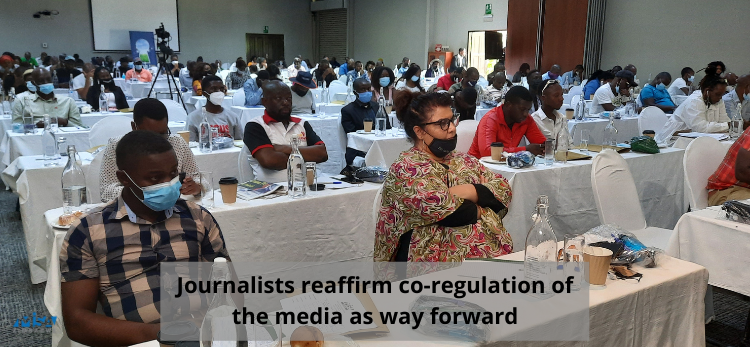MISA Zimbabwe National Governing Council (NGC) chairperson Golden Maunganidze was re-elected for another three-year term during the media freedom advocacy and lobby organisation’s annual general meeting held in Harare on 30 October 2021.
Maunganidze beat former vice-chairperson, Rutendo Mawere, who was also contesting for the position of chairperson. Ruth Butaumocho, who served as a committee member during the previous term, was elected unopposed as vice-chairperson.
Journalists, Pamenus Tuso and Kenneth Matimaire, were elected into the NGC as committee members.
The annual general meeting ended with journalists re-affirming their commitment to co-regulation of the media as well as democratic internet governance. This followed the convening of a workshop on the status of the media law reform processes which preceded the elective annual general meeting.
Earlier, in his report to the annual general meeting, Maunganidze, who is also MISA Regional Governing Council chairperson, said self-regulation of the media was at the “core” of securing a conducive operating environment and improving professionalism in the media sector.
He said MISA Zimbabwe thus remains firm on its position that co-regulation of the media is the way to go.
Under co-regulation, a proposed media council as espoused in the Draft Zimbabwe Media Practitioners Bill would be the first entry point for lodging complaints against the media while the constitutional Zimbabwe Media Commission, would be the appellant body.
“We are therefore encouraged by the open-door engagements we continue to enjoy with the Ministry of Information and the Parliament of Zimbabwe, in our quest for a democratic media environment, and more so, as we continue to consult on the outstanding issue of media regulation.”
Maunganidze noted the enactment of the Freedom of Information Act, licensing of the first-ever community radio stations and commercial television stations, as a step in the right direction.
He said this was the result of MISA Zimbabwe’s sustained and protracted Free the Airwaves campaign that the organisation together with the Zimbabwe Association of Community Radio Stations (ZACRAS), had “incessantly” been pushing for over the years.
On the Cybersecurity and Data Protection Bill that now awaits to be signed into law by President Emmerson Mnangagwa, he said:
“It is MISA Zimbabwe’s strong conviction that any form of regulation of the Internet should be aimed at creating safe online spaces for the exercise and enjoyment of rights as opposed to the criminalisation of online communication under the guise of dealing with internet abuse.”
The chairperson commended the organisation’s Advocacy Committees and the entire MISA Zimbabwe membership for being the lead ambassadors of the organisation.
“Their engagement meetings with senior police officers in the provinces … is further testimony of their leadership capacities in keeping the MISA brand alive and visible in pursuit of the Windhoek Declaration.”
“This has seen a marked reduction in the number of cases involving the arrests or harassment of journalists during the course of their work compared to the spike in media freedom violations that we witnessed in 2020.”









